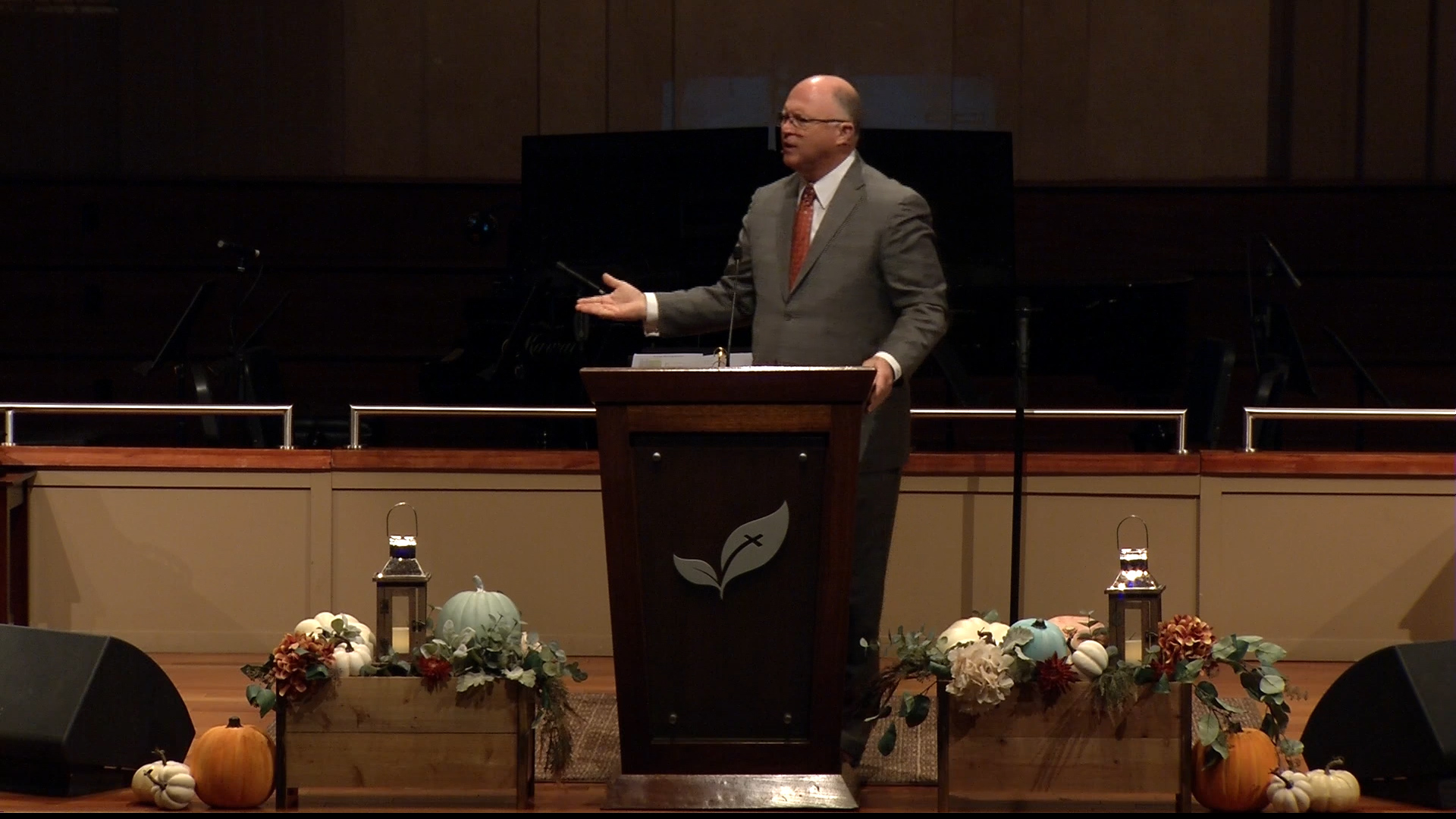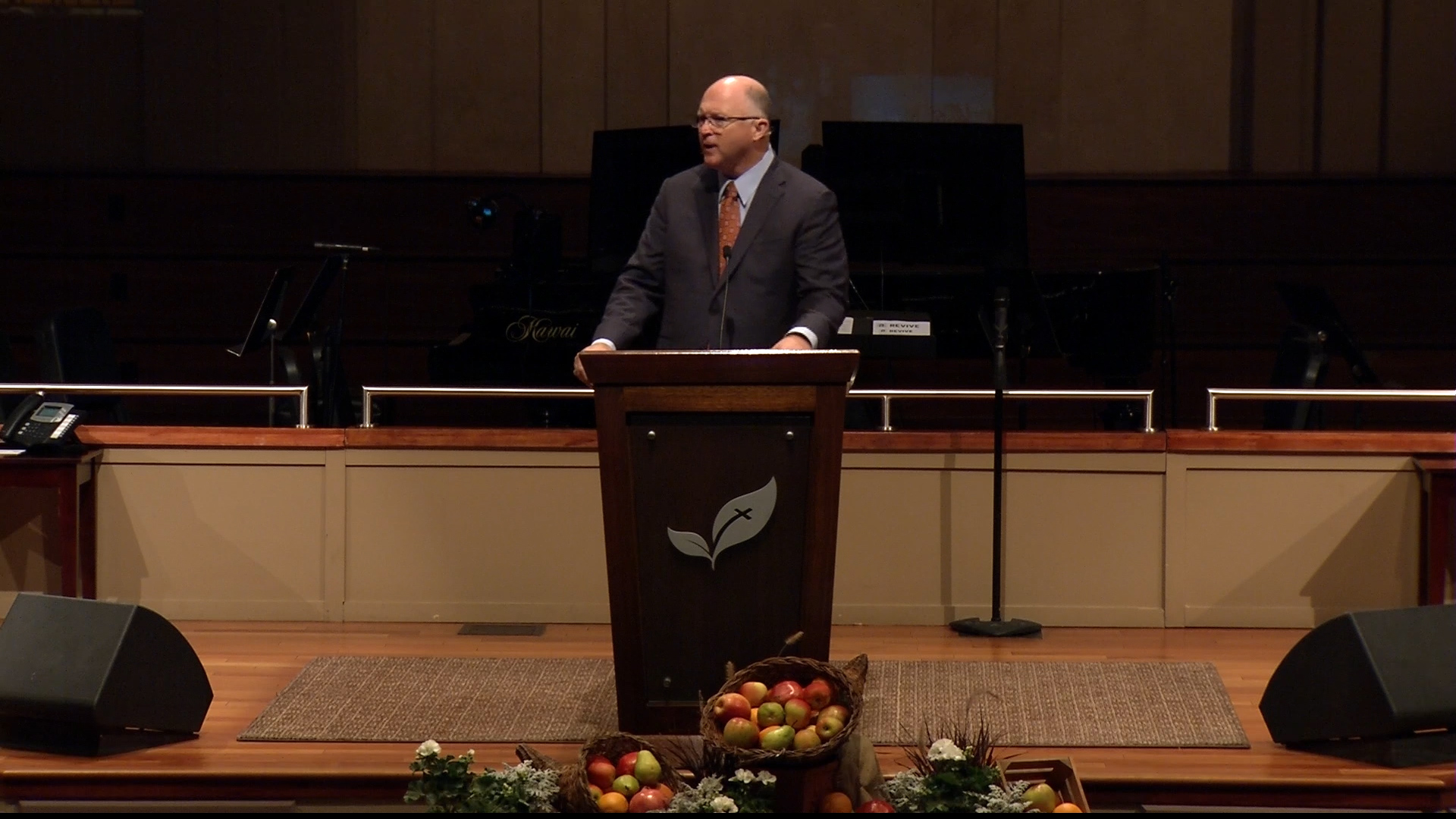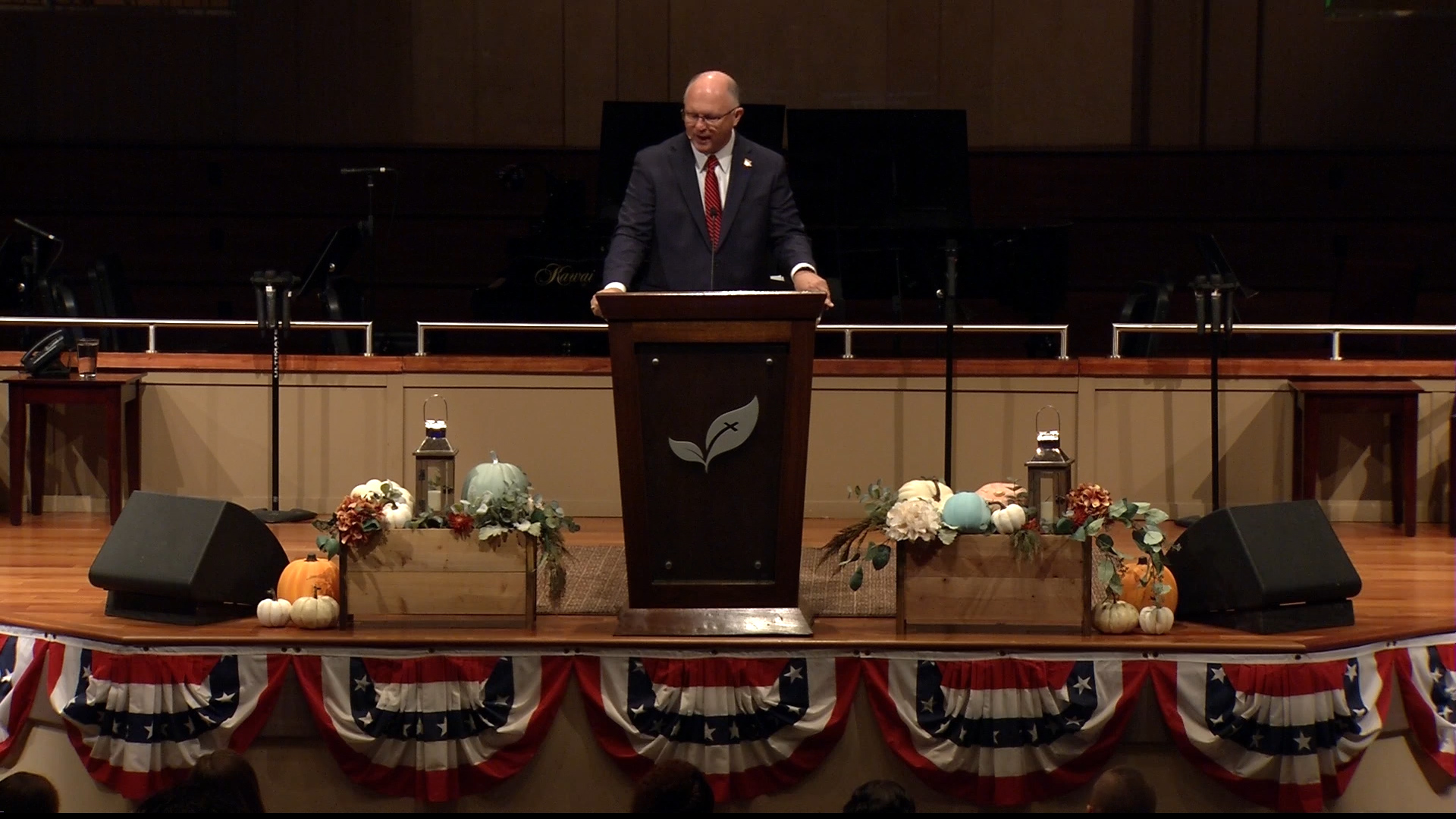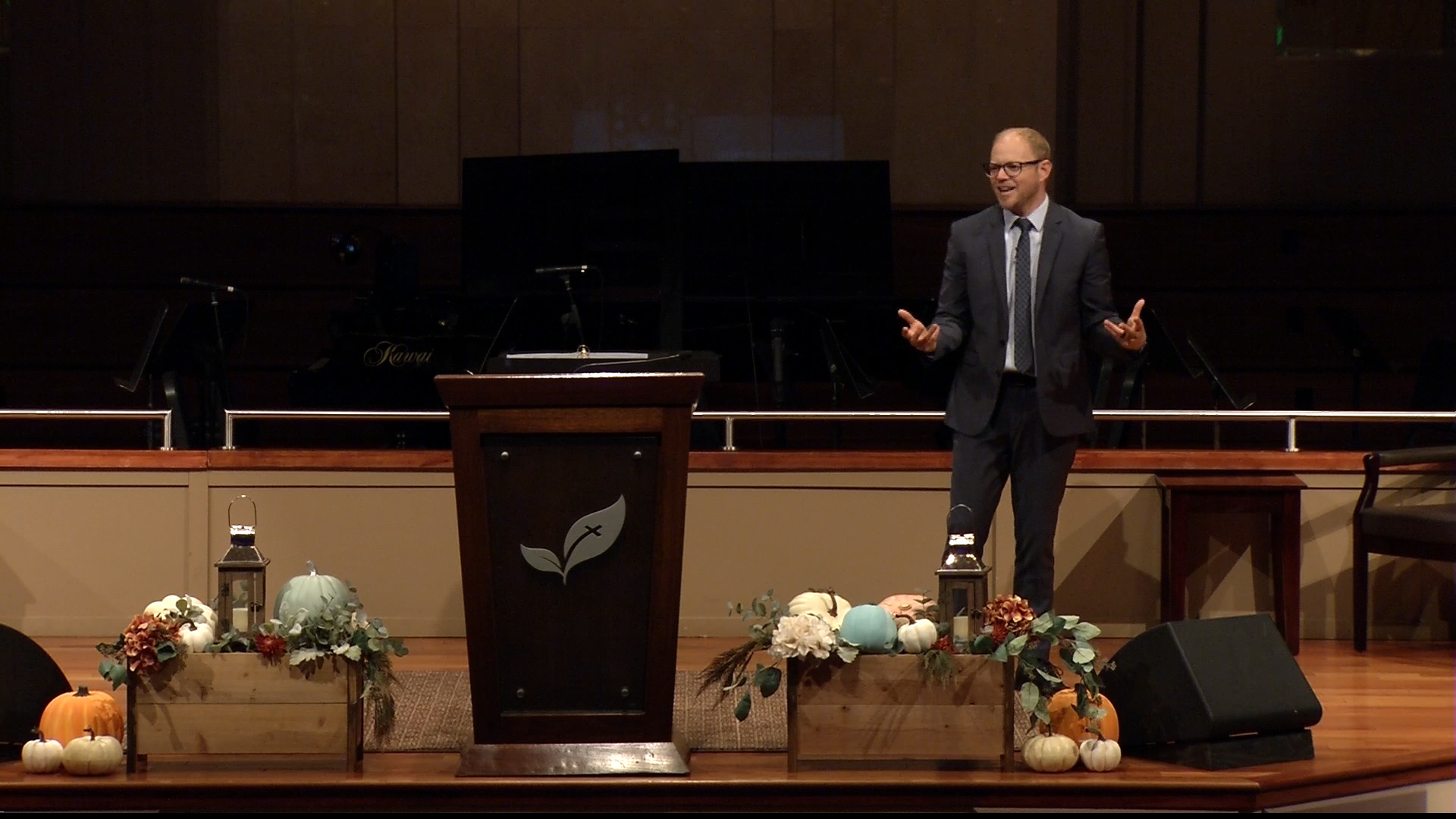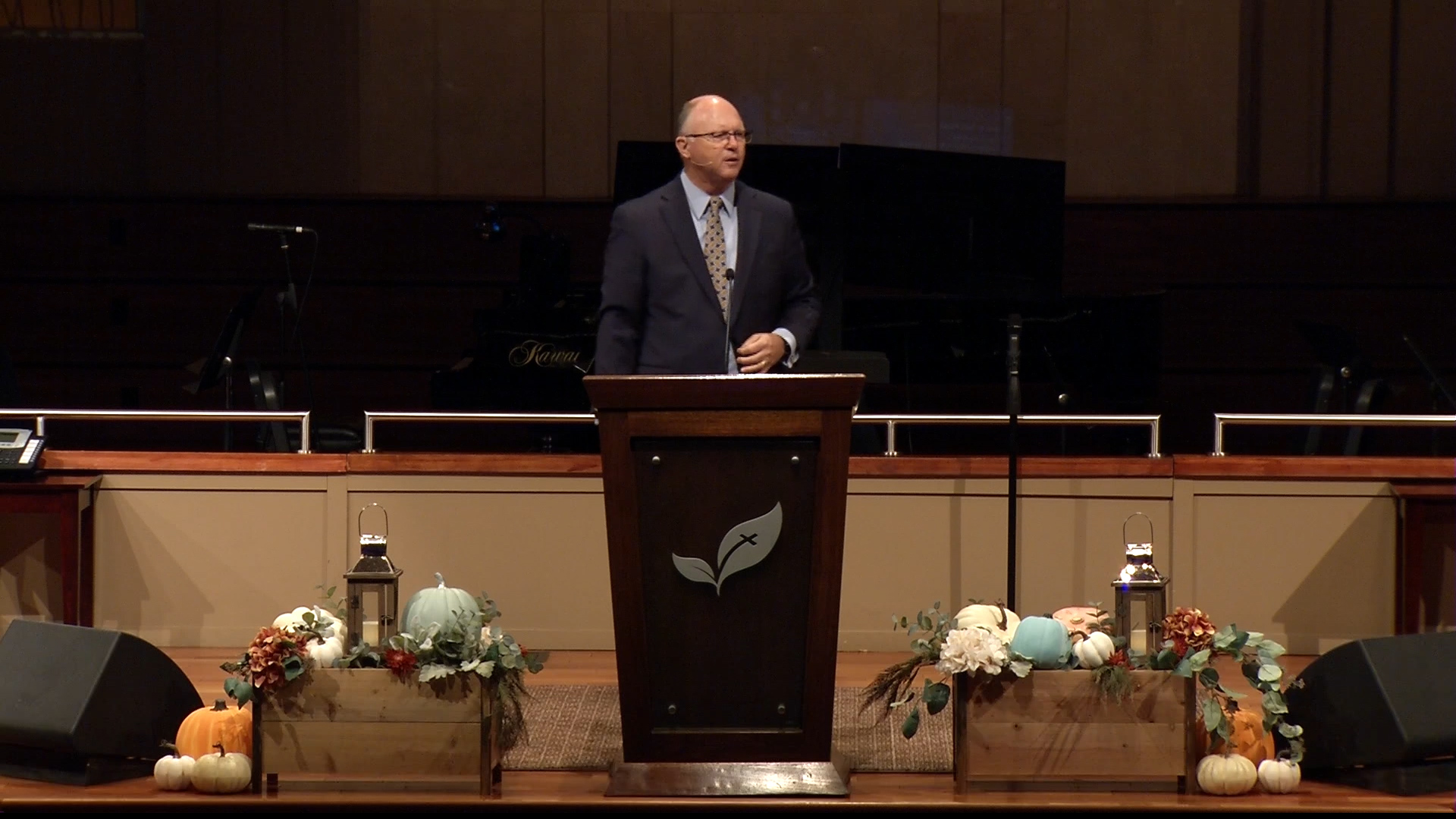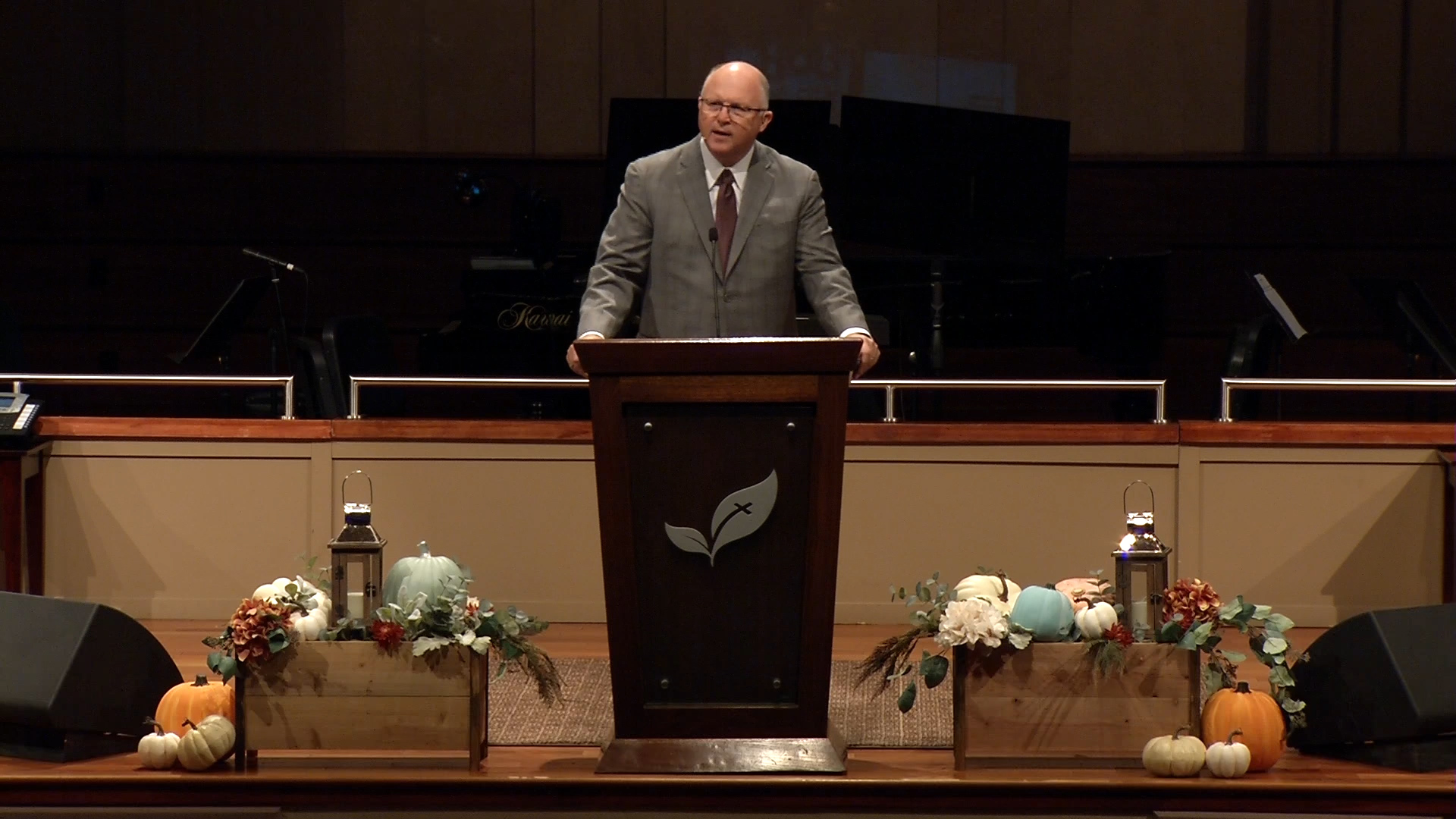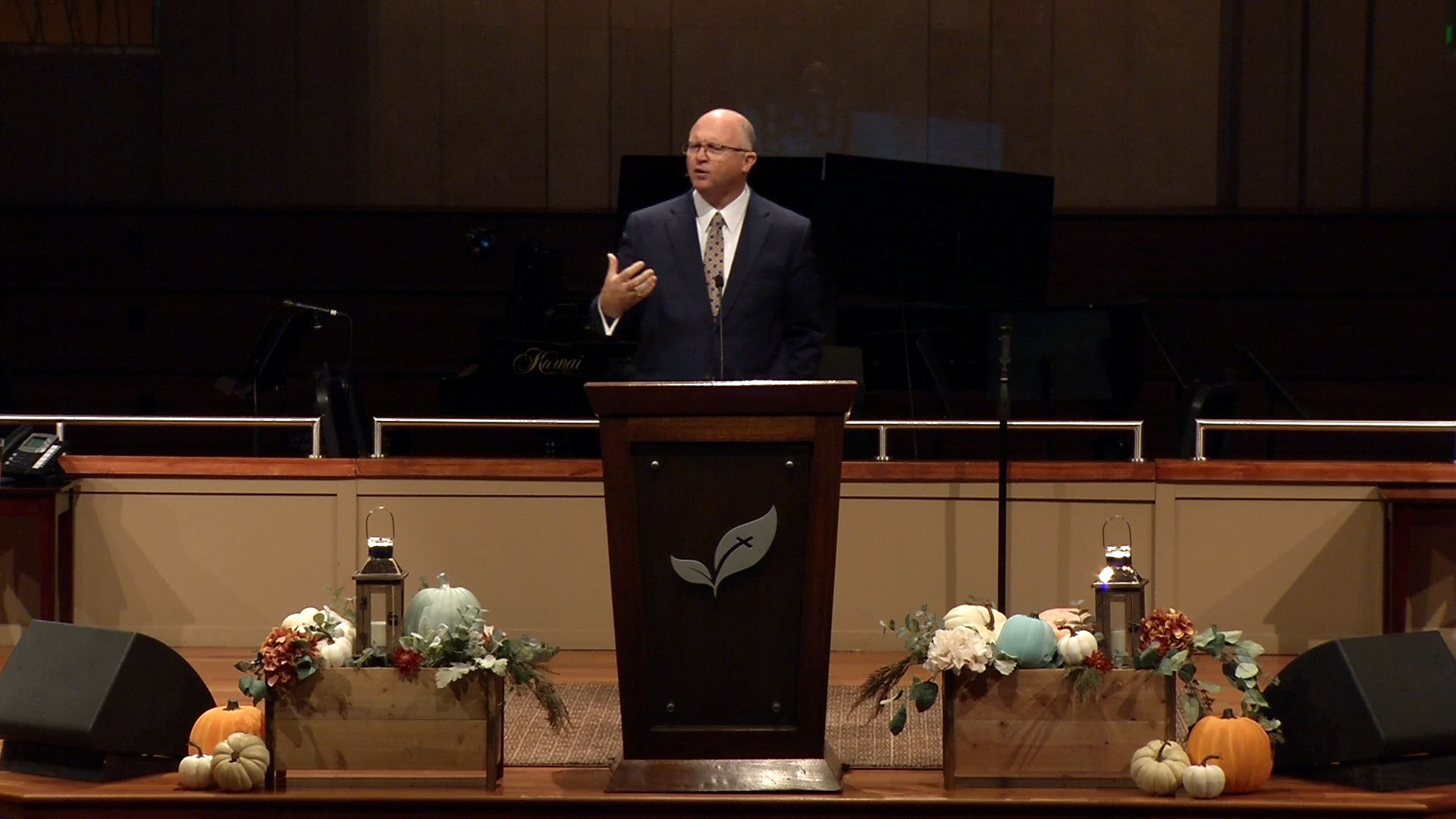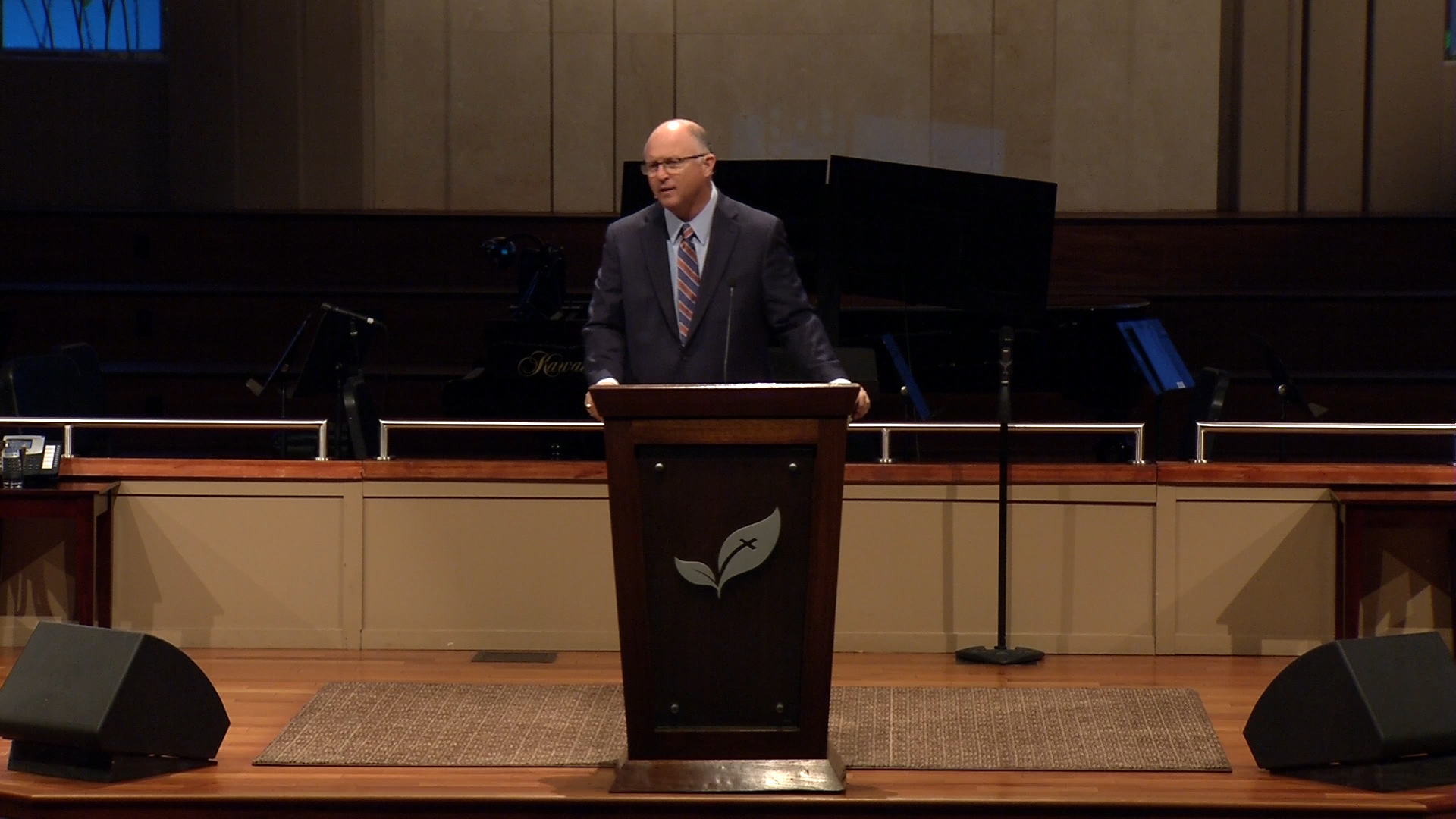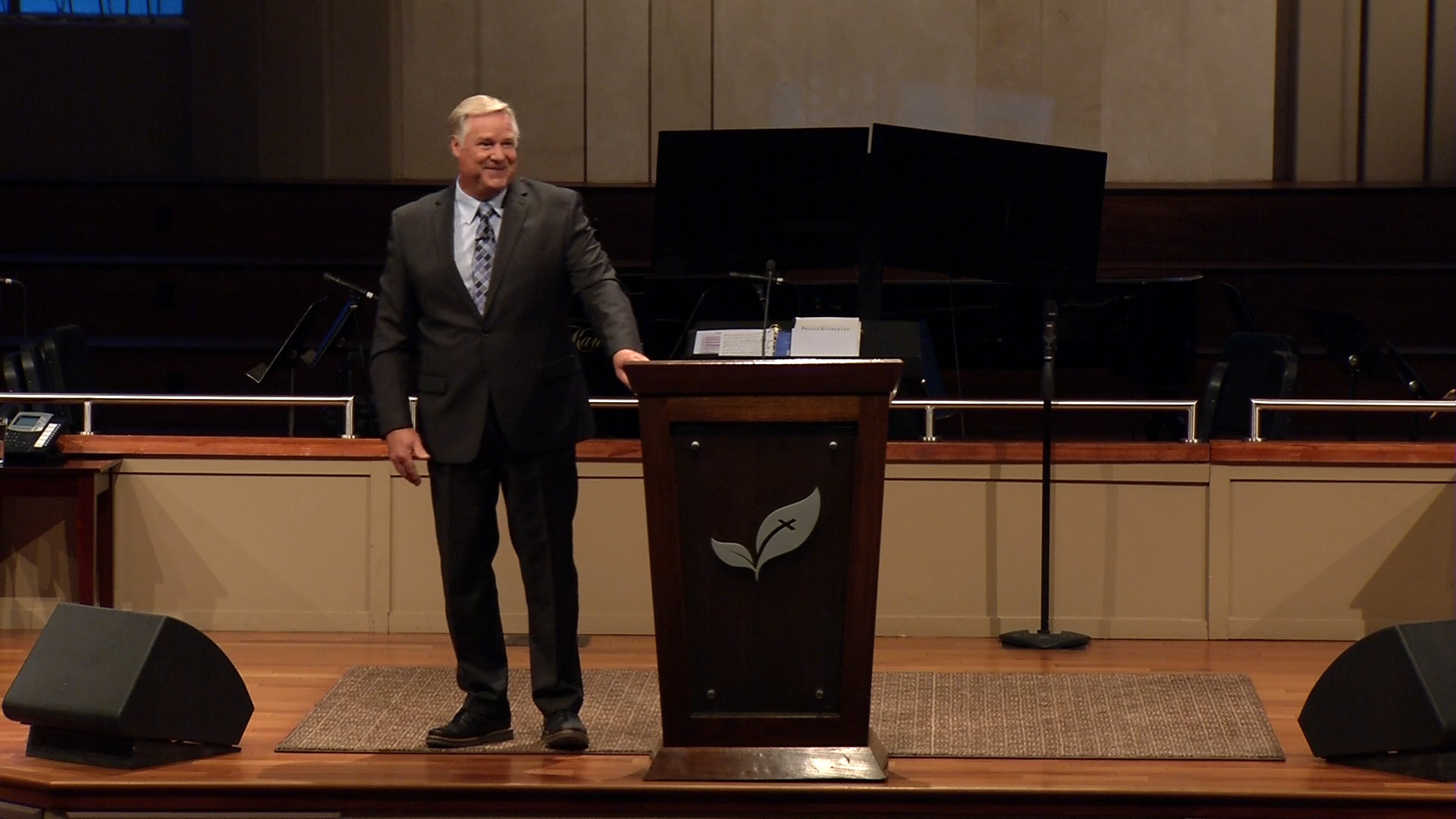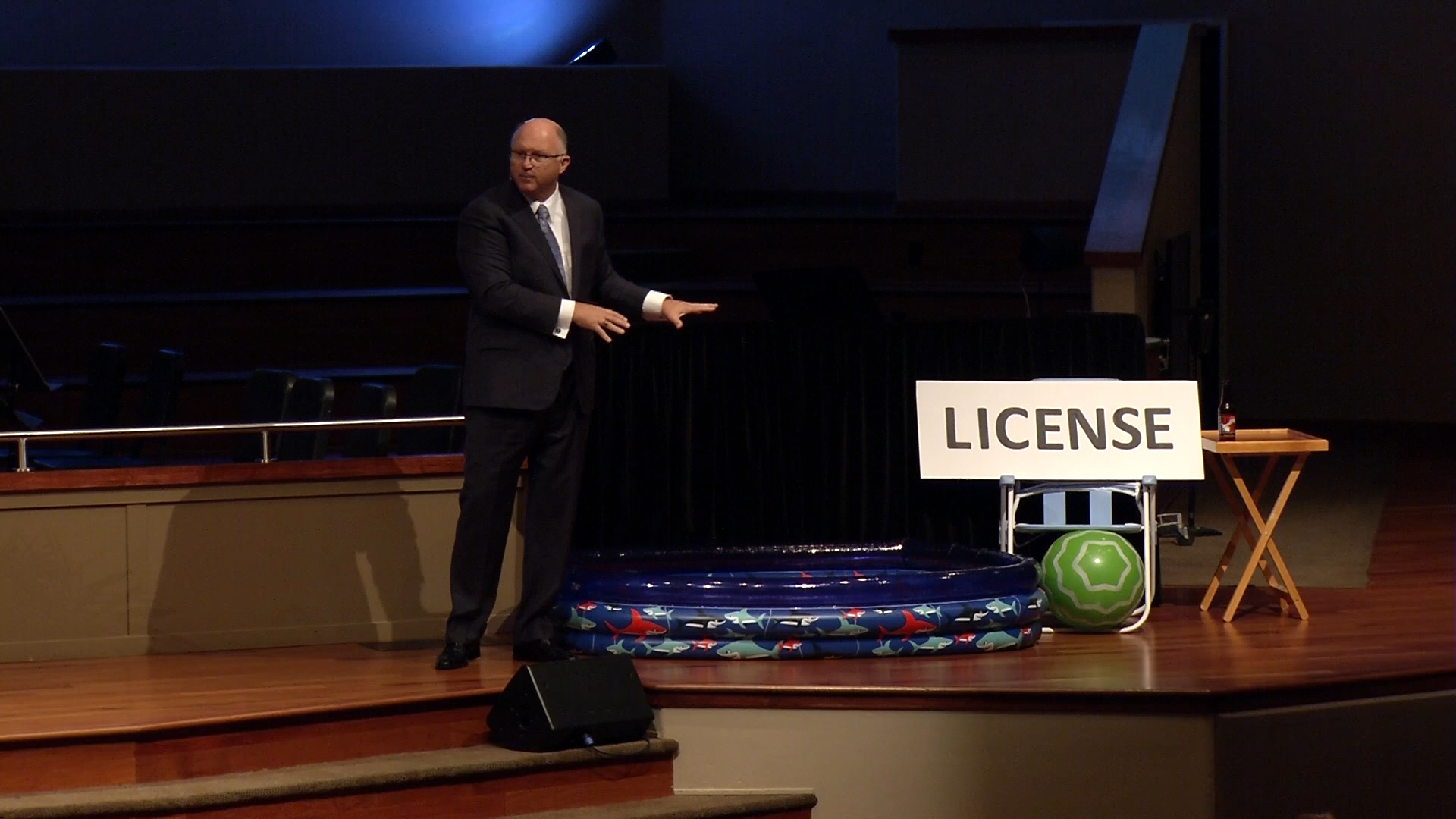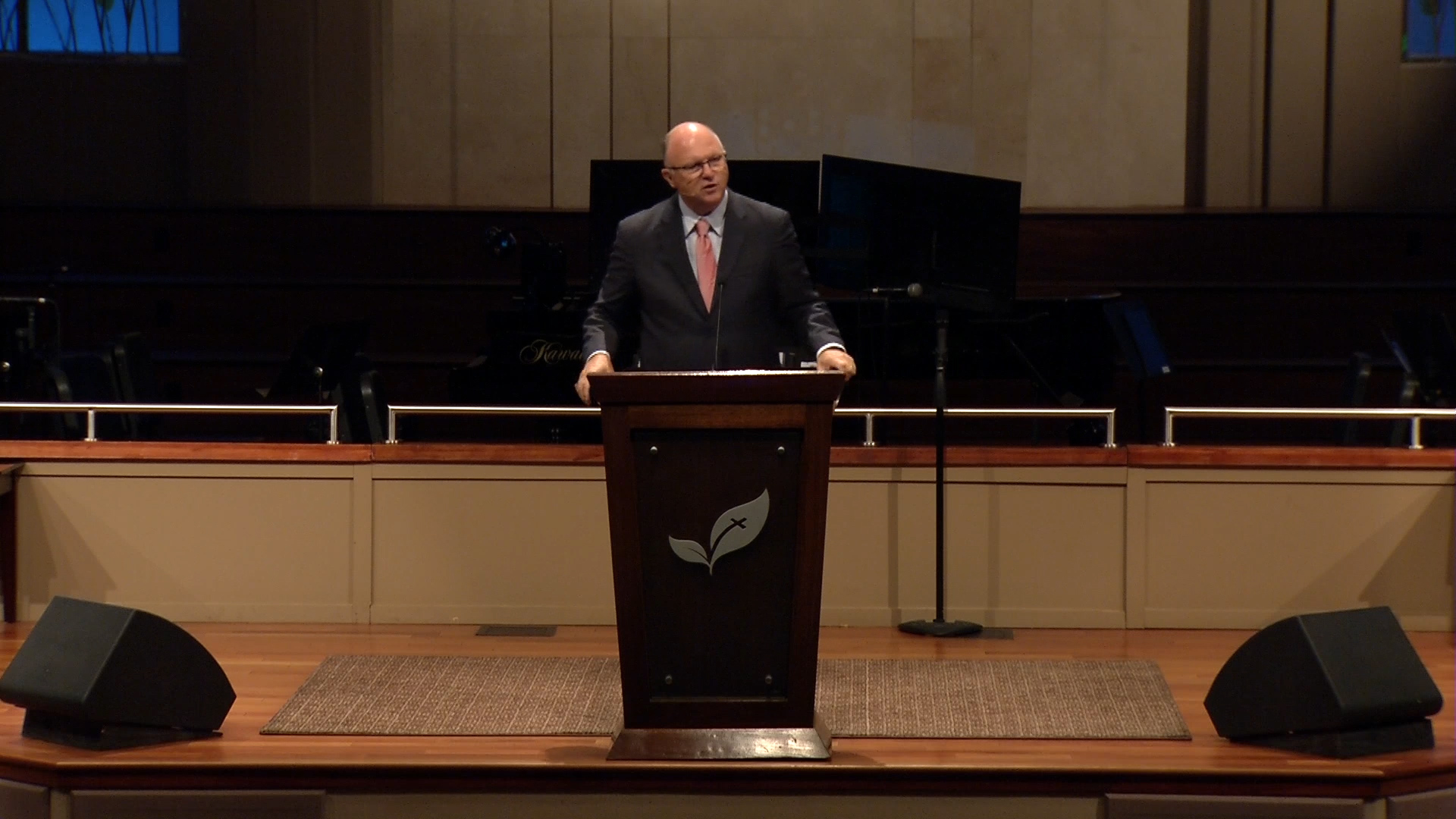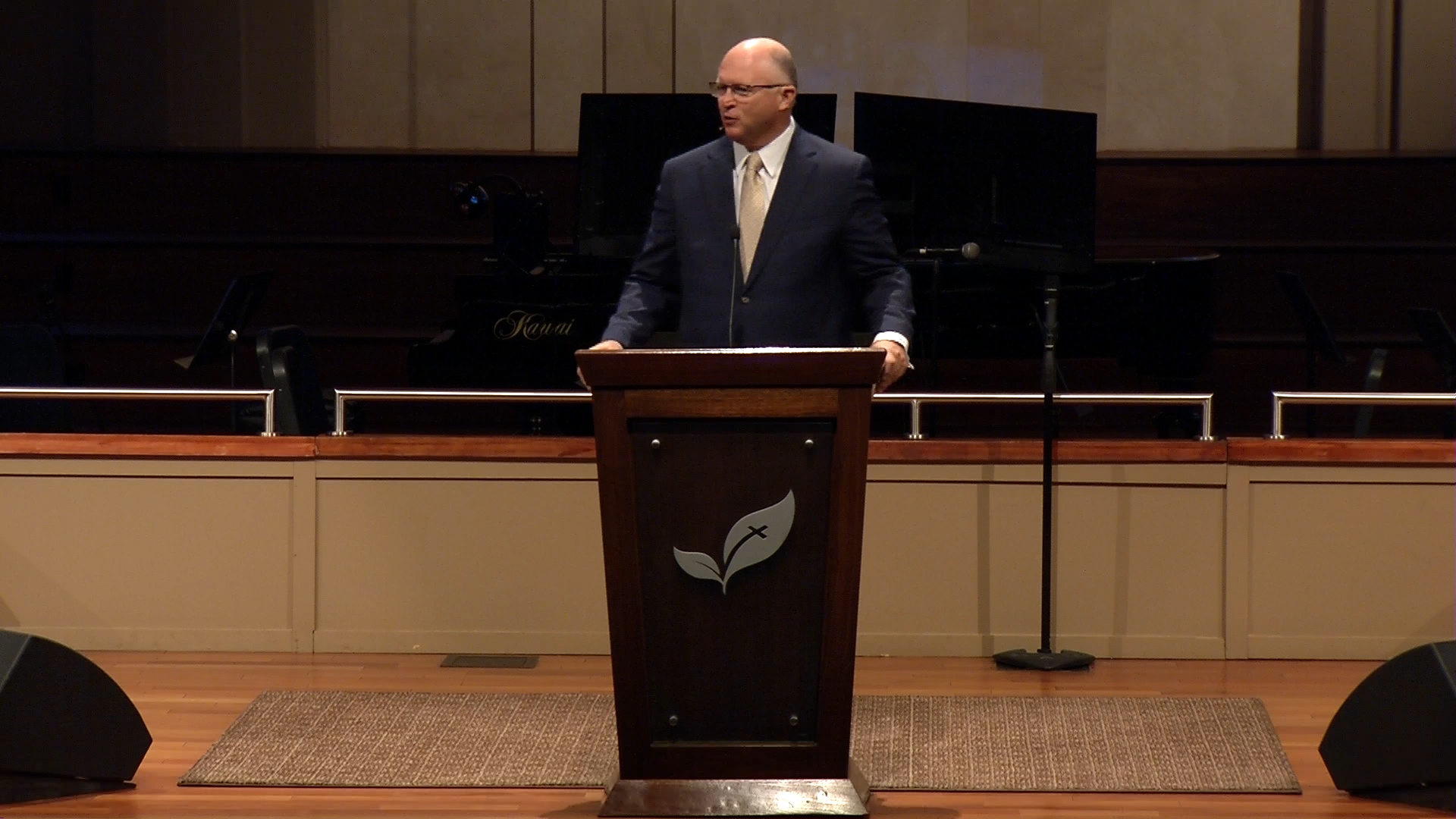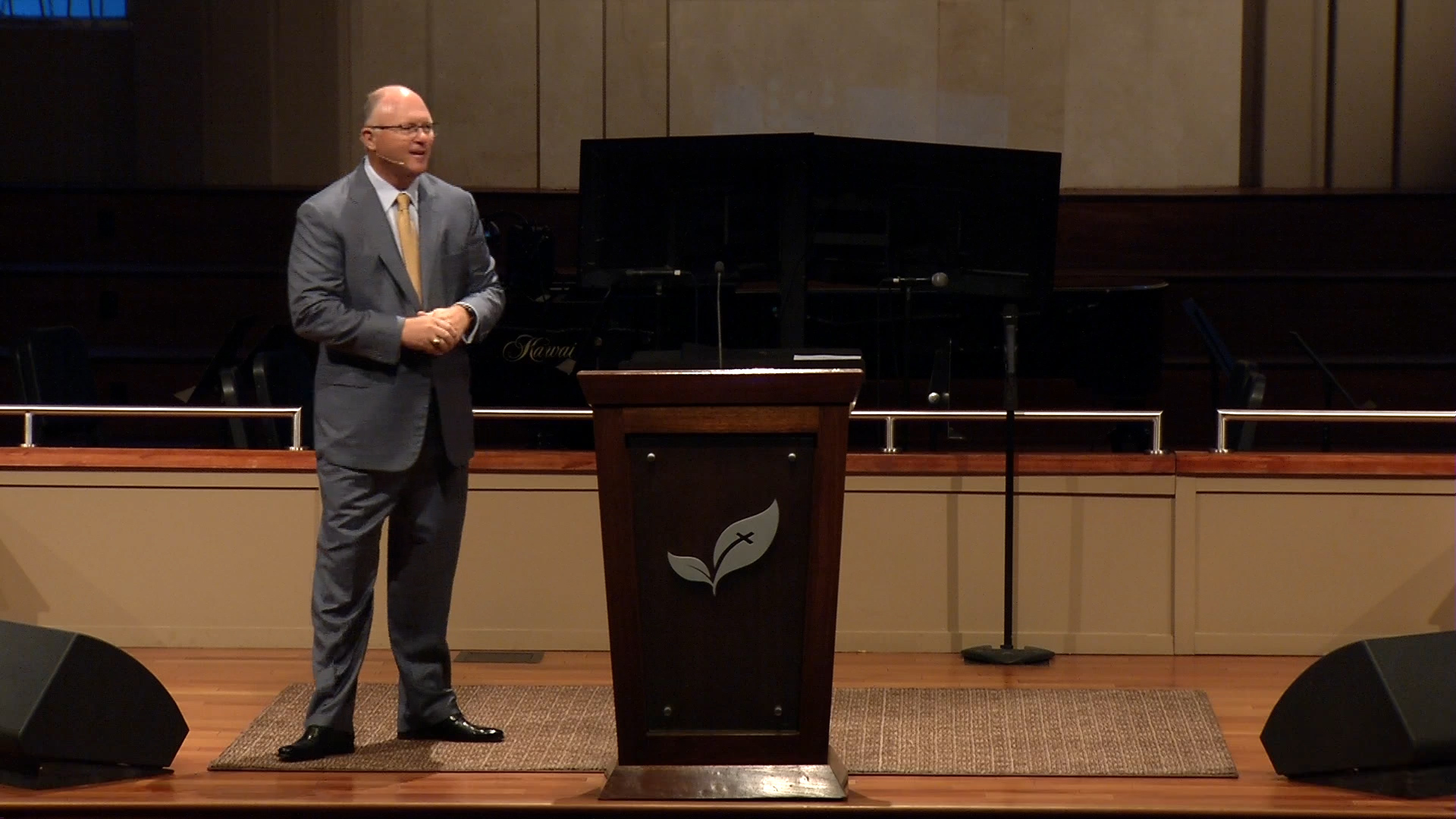Well, Galatians chapter 5, our text is verse 13. But I like to give the context and the background, so let's read beginning in verse 1. We're going to preach through some of these verses on the way to our text, verse 13. But let's read verse 1.
"Stand fast therefore in the liberty wherewith Christ hath made us free, and be not entangled again with the yoke of bondage. Behold, I say unto you, that if ye be circumcised, Christ shall profit you nothing. For I testify again to every man that is circumcised, that he is a debtor to do the whole law."
Now let me just pause quickly, we're going to see this in the message. The reference to circumcision is a reference to Old Testament Judaism to the Jewish law. And the people at Galatia had come to Christ, but the Judaizers were kind of pulling them back into the law. And so Paul is writing to them, calling them to stand in their liberty, all right. So we'll see more about that. But that's why you see the reference there to circumcision.
Verse 4, it says, "Christ is become of no effect unto you, whosoever of you are justified by the law; ye are fallen from grace. For we through the Spirit wait for the hope of righteousness by faith. For in Jesus Christ neither circumcision availeth any thing, nor uncircumcision; but faith which worketh by love. Ye did run well; who did hinder you?" By the way, nobody ever backslides by themselves, someone else is always hindering, always calling, gossiping, Twittering, whatever. He says, "Who hindered you," and notice that there, "that you should not obey the truth?"
Verse 8, "This persuasion cometh not of him that calleth you. A little leaven leaveneth the whole lump. I have confidence in you through the Lord, that ye will be none otherwise minded: but he that troubleth you shall bear his judgment, whosoever he be." How many of you get the idea the apostle Paul wasn't happy with whoever was troubling this church? He said, "That guy's going to bear some judgment for this."
Verse 11, "And I, brethren, if I yet preach circumcision, why do I yet suffer persecution? Then is the offence of the cross ceased. I would they were even cut off which trouble you." There he goes again; he's not happy with these that had troubled them.
Verse 13, "For, brethren, ye have been called unto liberty; only use not liberty for an occasion to the flesh, but by love serve one another." Let's say that last phrase together. Ready, begin: "But by love serve one another." So we're going to learn how to serve one another. And why? We're going to have a theological basis for it by the time we're all done, and we're going to do it in about 30 minutes.
Is everybody ready? Eh, it might take 37. Is everybody ready? All right, that's better. All right, let's pray together.
Lord, thank you for this wonderful time to open the Bible. Thank you that we've been called to liberty. Help us to understand what that means. Help us to serve from that place. And, Lord, bless this time in your word, I ask in Jesus' name. Amen. You may be seated.
During the American Revolution a group of soldiers were repairing their defenses with no help from their officer in charge. And as they were digging trenches and doing this work, a man in civilian clothes rode by on his horse; and he looked down to these troops and he said to them, he said, "Why," he said to the corporal in charge, "why are you not helping there?" and the corporal said, "Because I am a corporal."
And the stranger apologized for asking. He said, "Oh," he said, "all right," and he dismounted. He got down into the trenches with the men and he began to help dig out their defenses and working alongside these exhausted soldiers of the Revolutionary War. When he was finished, the civilian, or the man in civilian clothes, looked at the corporal and he said, "Next time you have a job like this and you do not have enough men to do it, then call for your Commander in Chief. Call for the Commander in Chief," and he said, "I'm sure he'll be glad to help you." And he said to the corporal, "By the way, my name is George Washington."
What I want you to learn today is that God has not given you a position of liberty so that you can find your way out of serving him, but so that you can find your way into serving him. We're going to learn this morning that God has given us a position of liberty for the purpose of service. And much of Paul's focus in the book of Galatians has been on teaching the Galatian believers that they were not to seek righteousness through the Old Testament law, that they were not to go back into the law as a means of pleasing God or a means of salvation.
So in Galatians 2:21, he said, "I do not frustrate the grace of God: for if righteousness come by the law, then Christ is dead in vain." Galatians 3:24, "Wherefore the law was our schoolmaster to bring us unto Christ, that we might be justified by faith. But after that faith is come, we are no longer under a schoolmaster."
So the book of Leviticus, the law ceremonially, the Old Testament law, was not given as a method of salvation or a means of salvation, but a schoolmaster to point us to our need for Jesus Christ, because anyone who has ever tried even keeping the Ten Commandments will say that, "If I had to keep all of the law in order to be saved, that truthfully, I fall short of that law. I cannot keep that law." So the law was not meant to be a way of salvation, it was meant to point us to the way of salvation, which is the Messiah, the Lord Jesus Christ.
So I want you to notice this morning as we come to the Scriptures, I want you to see in verse 1 the stand of liberty wherewith we stand. Notice in verse 1, "Stand fast therefore in the liberty wherewith Christ hath made us free."
Now the word "stand fast" is "to persist." It is "to persevere." Paul is urging the Galatians that they must remain firm and rooted in their position in Jesus Christ. And I want to speak to you for a few moments about our stand in the liberty of Christ, what it means to be in Christ positionally as a Christian.
First of all, when he speaks of standing fast in liberty he is speaking about our position in Christ. He says, "Stand fast in the liberty wherewith Christ hath made us free," Liberty, of course, means that we are free from bondage. It means that we have by grace been saved through our faith.
How many of you remember that in Ephesians 2:8-9, "For by grace are ye saved through faith; and that not of yourselves: it is the gift of God: not of works, lest any man should boast." So when someone is in liberty they have been the recipient of the grace of God. They have been set free by the grace of God. "For by grace are ye saved," and that is all activated when by faith we receive the Lord Jesus Christ.
When someone by faith accepts Christ as their Savior, now they have a new standing in the Lord Jesus Christ. They are given a position or a place of liberty. And so, God says, "I want you to stand fast in your liberty."
Now let me illustrate it for a minute. Brother Williams, you come up here and help me, I want you to help me today, representing a man that is standing in liberty, and I want to give you today, Brother John, a gift. By the way, how many know the Bible says that all of us fall short of the glory of God, but the gift of God is salvation through our Lord Jesus Christ? In other words, "The wages of sin is death," that's separation from God, "but the gift of God is eternal life through Jesus Christ our Lord."
Now if you're here this morning and you're not saved, God has a gift for you. It is a gift of forgiveness, it is a place that you have in Christ; but you must receive it. So Brother John, I want you to receive this gift that's been paid for by the Lord. And John wants to be saved, so we're going – you've got to take your coat off here because we're going to give you today the gift of salvation, the gift of liberty; and I have a nice shirt for John here that says he is free in Christ.
Now Brother Halk said, "Pastor, don't make me put that shirt on." So, Brother Halk, I've kept my word for you this morning. I chose a very small man. Come up here, Brother Williams. And Brother Williams may be a medium-size, all right, so that should fit. So put that on there and come right on over here. And Brother John Williams is going to represent for us a man who is standing in liberty. He has accepted Christ as his Savior. He is free.
Now what does that mean, "He is free"? Well, we see it means that he has a position in Christ. Notice in your notes there Romans 6:20, "Therefore by the deeds of the law there shall no flesh be justified in his sight: for by the law is the knowledge of sin."
He did not get his freedom by keeping the deeds of the law, he got his freedom by receiving Christ as Savior. God was please with his Son when his Son shed his blood. And now, the Bible says in 1 Corinthians, the Bible tells us that he, God, who knew no sin, God, he gave his Son Jesus Christ who knew no sin, that we might be made the righteousness of God in him. So we put on the righteousness of God when we accept Christ as Savior, and we are now free in Jesus Christ.
The Bible says in Romans 6:23, "The wages of sin is death; but the gift of God is eternal life through Jesus Christ our Lord." Well, what are we free from? Well, the Bible says we're free from the guilt of sin, Ephesians 1:7, "In whom we have redemption through his blood, even the forgiveness of sins, according to the riches of his grace."
We are free from the penalty of sin. The Bible says in Romans 8:1, "There is therefore now no condemnation to those that are in Christ Jesus." So this man will never face judgment, he'll never face the fire of hell; he has been set free, he is positioned in Christ. God says, "Stand in that position." It is a position of liberty. It is a position of freedom.
Notice verse 1: "Stand fast therefore in the liberty wherewith Christ has made us free, and be not entangled again with the yoke of bondage." Don't be ensnared or enslaved by this yoke of bondage by being pulled away back to the law by the Judaizes, by those Jewish people at Galatia who were saying essentially this: "Jesus is good. But to really stay close and to really know Jesus, you still have to keep the law, you still have to follow the law of Moses."
And some have tried. In fact, entire religions like the Seventh-day Adventists have been established by people who want Jesus in the law as a way to please God. But what the message of Galatians tells us is, "Don't be entangled again in the yoke of the law. You don't have to keep ceremonial law. You don't have to honor certain days or holidays in order to please the Lord." And so, we see there is liberty, and we see there is freedom.
Warren Wiersbe said of this passage, "When the believers in Galatia trusted Christ, they lost the yoke of servitude to sin and put on the yoke of Christ." So the servitude to sin was set aside, and now they serve Christ. The yoke of works is hard and the burden's heavy. Christ's yoke is easy and his burden is light. The yoke of Christ frees us to fulfill is will, while the yoke of the law enslaves us. So here we see a man that is in Christ. This stand of liberty is a stand or a position in Christ. Secondly, it is a position in grace. He has a position in grace.
Now look at verse 2: "Behold, I Paul say unto you, that if ye be circumcised, Christ shall profit you nothing." In other words, no works are required. You don't have to work to have a standing with God. Galatians 2:16, "knowing that a man is not justified by the works of the law, but by the faith of Jesus Christ, even we have believed in Jesus Christ, that we might be justified by the faith of Christ, and not by the works of the law." So if a religion says you have to do these works to have the acceptance of God, to have a home in heaven, Paul would say, "No, it's not by the works of the law."
And the works are not required. In fact, the law would demand that this must be completely fulfilled or it's not fulfilled at all. The law's demand then cannot be fulfilled. Notice verse 3 what it says: "For I testify again to every man that is circumcised, that he is a debtor," notice this, please, "to do the whole law." In other words, if you're going to please God by doing the law, then you've got to do the whole law.
Now the Bible says in James 2:10, "For whosoever shall keep the whole law, and yet offend in one point, is guilty of all." Now what we're going to learn this morning is that salvation is either all of Jesus or it's all of the law. But there's no hybrid faith that is taught in the Bible. It's either all of Jesus or all of the law. So you can't trust in Christ and trust in the law at the same time in order to be saved.
Notice verse 4 says, "Christ is become of no effect unto you, whosoever of you are justified by the law; ye are fallen from grace." Now this phrase "fallen from grace" is an interesting phrase. It means that you are making grace of no efficiency or of no efficacy. You are not then recognizing the importance of grace. Paul is not telling them they're losing their salvation, but what he is telling them here is that if you're saying that you're justified by the law, then you're saying that grace is of no effect.
You see, friends, grace is undeserved favor. If God saved you by his grace, it's not something you can earn, it's a free gift that is given. And because of that we have a position of grace that is given to us by God. And once you are in the position of grace and standing the freedom of Christ, then you can never truly fall from grace if you have been saved in the sense of losing your salvation. But you can essentially deny its effectiveness if you go back to the law.
John 10:28 says this: "I give unto them eternal life." And that's, of course, the Lord Jesus. And by the way, only he can give eternal life; no church can give it. He said, "I give unto them eternal life; and they shall never perish, neither shall any man pluck them out of my hand. My Father, which gave them me, is greater than all; and no man is able to pluck them out of my Father's hand."
How many of you are thankful for that verse? No one is able to pluck us out of the Father's hand. So the phrase "fallen from grace" does not mean lose your salvation, but it means that we're denying the efficacy of the grace of God. There is no hybrid salvation; it is either grace or works. It is either all of Christ or none of Christ is what the apostle Paul is saying.
So when a man is standing or a woman is standing in this position of liberty they stand, first of all, in a position of Christ. Christ is in them. They stand, secondly, in a position of grace. And, thirdly, they stand in a position of hope. And I want you to see that in verse 5: "For we through the Spirit wait for the hope of righteousness by faith."
So this man, since John has accepted Christ, he's standing in his liberty, he is spiritually free, he is in Christ, he is in the grace of God, no longer working or trying to save himself, trusting in God's grace; and he's in a position of hope, hoping for that day when he sees the Lord Jesus coming. And God says, "Stand fast there in your liberty." Why? Philippians 1:6 tells us the reason of our hope: "Being confident of this very thing, that he which hath begun a good work in you will perform it until the day of Christ."
And so, the believer has the confidence that God has made him completely righteous in Christ and more like the Lord Jesus; and one day he will see the Lord Jesus Christ. And so, this is the position of a believer. This is the stand of liberty. It is a position in Christ, a position of grace, and a position of hope.
I bet you're glad you got saved, aren't you? Amen. I'm glad you got saved too; I've been praying for this for a long time. So I'm glad John got saved. And now he's standing here positionally in Jesus Christ. He has ceased from his labor. He is resting in the grace of God on his way to heaven, because Christ paid the price on the cross of Calvary. This is the stand of liberty. Is everybody tracking with me this morning? We're going somewhere with this.
So we have a position when we're saved. We are set apart. We have been justified by Christ. We are free from the guilt of sin, free from the burden of sin, and free from having to work to get saved. We are saved by the grace of God. I'm just telling you, I could stop right here and I would have had a good service already; I'm just glad I'm saved this morning. So this is the position of a believer.
But I want you to see not only the stand of liberty, but notice, secondly, this morning, the subversion of liberty, the subversion of liberty. Now there were two attacks on liberty in the first century and they continue to this very day. And I have seen them over the years. The devil has used them in my life, he has used them in the lives of believers I've known; and the two attacks can be identified as legalism and as license. So we're going to learn about how the devil tries to pull us away from the simplicity that is in Jesus Christ. How does Satan try to pull believers away? Let's, first of all, talk about legalism.
Notice in verse 6 the Bible says, "For in Jesus Christ neither circumcision availeth any thing, nor uncircumcision; but faith which worketh by love. Ye did run well; who did hinder you that ye should not obey the truth?" Now the truth is represented right here. The truth is that Jesus paid it all, all to him we owe. We're saved by grace, we're standing in grace; this is the simplicity of Christ. But Satan wants to hinder us and he wants to take us away from the simplicity in Christ, and he wants to bring us into bondage again. And this was the problem in Galatia. The Judaizers were bringing people to legalism.
Now let me quickly define legalism for you. First of all, legalism is when you add self-effort to faith in Christ for salvation. Legalism in the strictest definition is when we add anything to the cross of Christ. That becomes legalism; we're adding our self-effort. We're saying, "You've got to have Jesus, but you've got to do this," and it becomes a form of works. And we know that we do not get saved by getting baptized or going to Sunday school; we are saved by the blood of the Lamb alone, right, the death, burial, and resurrection of Jesus Christ, the gospel.
But legalism always wants to add to the gospel, okay. Secondly, legalism could be described this way. It could be described as emphasizing rules more than a relationship with Christ. And the problem with this is that it is what is called legalistic living; that is to say that we're emphasizing rules more than a relationship. And what happens is and what I have seen is, people – and you've seen this too – they look right, they live right, they're climbing the latter of legalism which produces self-righteousness, and they know how to find fault in everyone else. But suddenly you hear that, perhaps, the man left his wife; or, perhaps, someone fell into some other form of sin or alcoholism. And what we have learned is outward legalistic look does not always mean then the heart is really right with God. And that's the danger of legalistic living is that we know how to play the part, but we're not really truly loving the Lord with all of our heart.
Now let me say this this morning, that doing good works or living out a righteous life, the righteousness of Christ, or having biblical guidelines for your life, that is not legalism. In fact, that's just Christian living. Sometimes people say, "Well, the church wants me to attend church," and, "Pastor's teaching this from the Bible," or, "My Sunday school teacher taught that we should not forsake the assembling," or, "We should give," or, "We should help the missionary," and, "They just want us to do these things." Listen, doing those works for the Lord is one of the reasons we were saved – and we'll see that in just a moment.
Ephesians 2:8 says we're saved by grace. Ephesians 2:10 says that we are his workmanship, that God has a purpose for our life. So doing good works is not legalism, but emphasizing those things that we do over the person we worship, that can become very legalistic. That becomes just about doing things and no longer about Jesus Christ.
So Titus 3:8, "This is a faithful saying, and these things I will that thou affirm constantly, that they which have believed in God might be careful to maintain good works." How many of you would agree with me this morning God wants all of us to maintain or to be involved in good works. Can I get an amen on that? So living a life of works for Jesus is not legalism, but when I'm emphasizing and glorying in my works, that's a legalistic spirit, a self-righteous spirit, and Jesus is not glorified when that spirit comes into our lives.
So we see here the hindrance of legalism, and he says, "Who did hinder you?" It means here "to change your course." And we see the hurt of legalism in verse 8: "This persuasion cometh not of him that calleth you." In other words, John, when someone's trying to tell you that the Christian life is simply about a list, and they're not teaching you to exalt Jesus Christ in your life, I want you to know that's going to hurt you if you get your focus off Jesus Christ.
So I want to encourage you to stand in your liberty here, and don’t get persuaded and involved. In the first century, idea was to gain your salvation. The modern-day context would be to gain your reputation, or to have this idea that you're the holier than thou or the best. So legalism is a pull, it is a subversive pull away from the simplicity of the gospel.
But now let's come to our text, because I want to show you the second pull. The Bible says in verse 13, "For, brethren, ye have been called unto liberty." That's John. He's free; he's standing in liberty. "You have been called unto liberty," verse 13, "only use not liberty for an occasion to the flesh."
Now here we're going to see the opposite of legalism, and that is what we call "licensed." That is the abuse of liberty. That is the Christian that says, "I'm free, so I can go back and live how I want. I can go back to my party days. I can go back to my drinking, my carousing, doing whatever I want to do." And this is called license or the abuse of liberty. And the Bible says, "Use not your liberty as an occasion to the flesh."
Now let me just pause to say this realm right here is where the majority of Christian authors today are writing from. They are taking the of grace to this extreme. They like to kick at legalists. In fact, they like to talk about anyone faithful to the Lord sometimes, and just with a broad brush, "Yeah, they're legalists."
That may or may not be true. There is legalism in some churches; but the great problem in America today is not legalistic Christians, it is Christians given to license, it is Christians that are so involved in a misunderstanding of liberty and grace, that the church has weakened. And they're not in church today because this brand of license has convinced them that, "I can live how I want and do what I want, go where I want, because I'm under liberty."
Now this is a subversive pull on John who is simply wanting to stand in the liberty of Jesus Christ. So let's look at this verse. It says in verse 13, " For, brethren, ye have been called to liberty," we saw that, "only use not liberty for an occasion," or a base of operations, or an excuse. Paul says not to let your freedom be the launching point to bring you back to sinful activities and lifestyles.
Sometimes theologically this is referred to "antinomianism" or "against the law." And some would say things like, "Just give me Jesus. I don't want to hear anything else in the Bible." But I want to tell you something. The Bible says, "In the beginning was the Word, and the Word was with God, and the Word was God.
Listen very carefully: every time I preach and expository message through the verses, through the Word of God, I am giving you Jesus, because he's the Word of God," you see. But some people say, "Well, I don't want to know those commandments. I don't want to hear the dos and the don'ts, I just want to have my freedom, and I want to love Jesus and enjoy my freedom."
And the fact of the matter is that while we must love Jesus and be motivated by the love of Jesus, that we cannot be pulled into a life style of license. Romans 6 says it this way: "What shall we say then? Shall we continue in sin, that grace may abound? God forbid. How shall we, that are dead to sin, live any longer therein?" You see, positionally, this man is now alive to Christ.
How many of you have been baptized? Raise your hands up, let me see where you guys have been baptized, right? When you were baptized you identified with the death, burial, and resurrection. And the Bible says in Romans 6 that you were buried in the likeness of his death, raised in the likeness of his resurrection, typifying death to the old life, resurrection to the new life.
"How shall you, being dead to sin, and identifying with Christ, how can you continue in sin? Should we continue in that grace may abound? God forbid." That licensed lifestyle is not a biblical lifestyle, it's a leaning to the flesh. So in this context, it is anything that comes from the sin nature and the self-effort of man.
Romans 8:5, "For they that are after the flesh do mind the things of the flesh; but they that are after the Spirit the things of the Spirit." You see, every saved person still has that fleshly nature. My friend Ed Bordell, a missionary friend in Costa Rica, calls it his flesh suit. He calls it his earth suit. He says, "I live in my earth suit," a fleshly nature.
How many of you understand that even though we've been redeemed and we're on our way to heaven, we still have an old Adamic nature. We still in this old body. And there's temptations and there's trials that come. But look what the Bible says in Galatians 5:16, "This I say then, 'Walk in the Spirit, and ye shall not fulfil the lust of the flesh.'"
So what do we find today? We find Christians that have come to a place and say, "Well, I'm under liberty. I can party hardy. I have the license to do that now. Grace means that I can do whatever I want." Now you say, "Well, if I'm truly saved and I do some of these things, will I still go to heaven?" We're not talking about going to heaven; grace is grace.
If you were truly saved you'll truly go to heaven. But is this the purpose of God's grace in your life so that you can go back to the way of the world? And someone says, "Well, you know, I had a friend; they said that on Twitter. They said that on Facebook. I saw someone write a book about it." I'm simply saying, friend, is that really the purpose of your salvation so you can go back to living like you lived before you got saved? No. Shall we continue in sin that grace may abound? What's the answer? God forbid.
Now look, I've been preaching for 37 years. This that I'm preaching to you, these two extremes I've seen them. I've seen them in our church. We've had some wonderful people that lean this way. I've seen some that have leaned this way. I've had staff lean this way and that way. I've seen people that have sort of – I've probably read a dozen books on both sides of this. I'm here to tell you, my friend, God does not place us in liberty so that we can confound it by going back into the law; and God does not place us in liberty so that we can confound it and hurt our testimony by going to license.
So that brings us finally to this final point this morning: The service of liberty. The service of liberty. Everybody still with me this morning? All right, here we go. Here's the service of liberty.
Someone says, "So I have this liberty, I'm free. What do I do with it? I can't climb the ladder. I can't go to the pool." And I know some of you are going to out of here today, someone's going to say, "What did pastor preach about?" He preached against women; that's all you got out of this message. That's all you got out of this, we just "choo," we didn't get on the right path.
My grandson was at our house swimming the other day and he has these little goggles, little Chandler, and he came up to me, and he had the goggles on top of his head, you know, and put his hand on his hip, and he says, "Papa," he says, "you know that river up there in heaven?" I said, "Yep." He said, "Do you have to have goggles in it when you swim in it?" That was his big theological question this week, you know.
So I'm not preaching against swimming, but trying to illustrate the lifestyle of party hardy license, right? So God says, "I've given you liberty." And we've established this morning, it's not so we can go back to the law, it's not so we can go to a lifestyle of license. So what do we do with it? Freedom is not an opportunity for sin or self, freedom is an opportunity for service; and that's what I want you to see.
Look at verse 13: "For, brethren, ye have been called unto liberty; only use not your liberty for an occasion to the flesh, but by love serve one another." Let's say that last phrase, "but by love serve one another."
So you see, in this respect I'm serving self because it makes me look better. In this respect I'm serving sin, because I'm going back to the says before I was saved. God says, "I don't want you to serve self or sin, I want you now that you are free to take that freedom and serve others with that freedom."
You see, that's why I've never had a bus worker in our church ever, ever argue with me about, "Oh, I just think I should be free to live how I want to live." You know why? They're too bush serving to have to arguments. They don't have time to go chat about it. People that understand, people that are mature in the Lord, they don't have time to chat about this or that, they're serving right now. They're helping other people.
Now this service must be a service of love, a service of love; and it must be a service of love, first of all, for the Lord. You see, the Bible says in 2 Corinthians 5:14, it's in your notes, "For the love of Christ constraineth us; because we thus judge, that if one died for all, then were all dead." So a mature Christian does the math and the say, "Whoa, if Jesus died for everyone, then all of us needed salvation; we were spiritually dead." And if Jesus did that for me, then we don't think, "What can I do for myself?" right? We think, "If Jesus did that for me, what can I do for him?"
The love of Christ constrains me. We love him because he first loved us. And listen very careful: the origin of what you do is more important than what you do. Why do you do what you do? And I pray that you do what you do in ministry because of your love for Jesus Christ.
I know sometimes people probably look at a church like ours and they go, "Some of those people have been attending and giving and doing those busses and all that choir and all that stuff for 30-plus years. They must be under the bones of legalism. Boy, Pastor Chappell must just crack a whip." No, these are people who are in love with Jesus Christ, and the honeymoon hasn't ended. And because of their love, because the origin of their ministry is for Jesus and not for a list and not for this or that, they just keep on doing it, because they love the Lord Jesus Christ. You see, for the Christian, fear of violating a law or breaking a rule is no longer a motivation. The motivation is love for the Lord Jesus Christ, which then leads us to a love for one another.
Now look at your notes quickly, Mark 12:30. It says, "And thou shalt love the Lord thy God with all thy heart, with all thy soul, with all thy mind, and with all thy strength: for this is the first commandment. And the second is like, namely this, 'Thou shalt love thy neighbour as thyself.' There is none other commandment greater than these."
I just want to tell you something: when you fall in love with Jesus you're going to want to help other people, because Jesus said, "As the Father has sent me, even so send I you." So it is a service of love and it is a service for others; for even the Son of Man came not to be ministered unto, but to give his life a ransom for many. And wherever real Christianity has abounded, this service is very, very evident.
One author said, "For centuries, Christians have been the primary agents of charity and compassion in Western culture. From the first century forward to the founding of the American colonies, Christians took the lead in caring for the hungry, the dispossessed, and the afflicted. This was, in fact, the hallmark of authentic Christianity."
Listen, when Christianity is happening by people who are free and who understand the purpose of their freedom, I'll tell you what happens: entire communities, as we shared last Sunday night, 34,000 people have trusted Christ as Savior through the ministry of this one church. Why? Not because of Christians that were legalistically bound to a list or giving to license and going back into the world, but because of Christians who said, "Thank God I am free; and I want to use my freedom to tell other about how they can be free in Jesus Christ."
When liberty is understood and lived, hospitals are built, and orphanages are built, and missionaries are sent. When liberty is understood, it's no longer about self, it's about serving the Lord Jesus Christ. And there's many ways, I've given you five; and you can see the list in your outline.
How can we serve others even this week? Sometimes we can do that through restoring others, having a spirit of meekness. You see, the legalist doesn't have a spirit of meekness, he's up here on his ladder going, "Look at that guy right there cussing and living like that." All he cares about is that he looks better than him.
But when this person has the spirit of meekness, he can go to that man and say, "Hey, man, I don't know what's going on in your life, but come on back to church, we miss ya. There's no judgment here, just come on back." Let's come back to serving the Lord, restoring, bearing a burden.
Do you know how many people in our church today have cancer? I just prayed with one dear man before this service, just a dear man in our church.
Now you can get out on your little chatroom and discuss license or legalism or the latest issues of the day, but somebody has to be really trying to help other people. There's too many fatherless in this church. There's too many folks struggling. Someone's got to use their liberty not to do this or this, but to serve these people. Someone's got to pray.
Every month I get a letter from the Philippines from our Bible College there, Brother Rick Martin's college. It says, "The following students have dedicated to prayer and fasting this month," if I could say it this way, "for your pastor." They don't have a lot of money, they can't do a lot of things, but they can pray; and by love that's how they're serving.
We can give. "If you see a brother or a sister naked or destitute of food, and you say to them, 'Depart in peace, be warmed,' notwithstanding you give not those things that they need, what doth it profit?"
We learned a few weeks ago we can visit people. "Pure religion and undefiled before God and the Father is this, 'To visit the fatherless and widows.'" I'm saying, look if there's someone that you can serve today. Now catch it quickly. Here we see a stand that we have in Christ, forgiven, free from guilt, free from the penalty of sin; and yet we see this subversive pull, the pull to legalistic living, the pull to license, and then we see the service that God has called all of us to do.
There's three kinds of Christians today then. First, there's the Pharisaical: "I do more than you do, so I'm better than you are." And that is the exact opposite of what the gospel teaches. Second, there's the narcissistic, or the sensual. There are those who have come to the place to say, "I'm under liberty, I can do whatever I want; let the good times roll. Give me some Burger King Christianity. I want Christianity, I just want it my way."
And then there's the Christian who says, "I'm free to serve. I'm not using my liberty for self or for sin. I want to use my liberty to serve the Lord Jesus Christ." A mature believer is motivated by grace to serve others, not to promote self, and not to live a life of sin. And so, our challenge today: stand fast in the liberty. Use not your liberty as an occasion to the flesh, but, say it with me: "By love, serve one another." Say it: "By love, serve one another."
Thank you, John. How many of you are glad he's free today? Amen. You can be seated, you did a good job. Thank for Brother John.
Now someone might be here this morning and you might say, "I don't know if I'm free. I don't know if my sins are forgiven. I don't know if I'm standing in Christ. I don't know if my sin has been washed away, or that I'd go to heaven someday." Then I say to you, "The wages of sin is death; but the gift of God is eternal life."
This gift has been paid for, and you can receive it. And I want to invite you this morning to come, not to receive a cardboard box, but to open your heart to Jesus Christ, and let him forgive your sin and save your soul. He wants to save you, but you've got to receive the gift. You've got to trust Christ as Savior. And if you've never done that, then today should be that day.
And then, if you're in this auditorium and you're saved, and you know you're forgiven, and you know God's grace is on you, are you using that liberty to serve others or selfish things? May God use us in these upcoming weeks to by love, serve one another.
[End of Audio]

